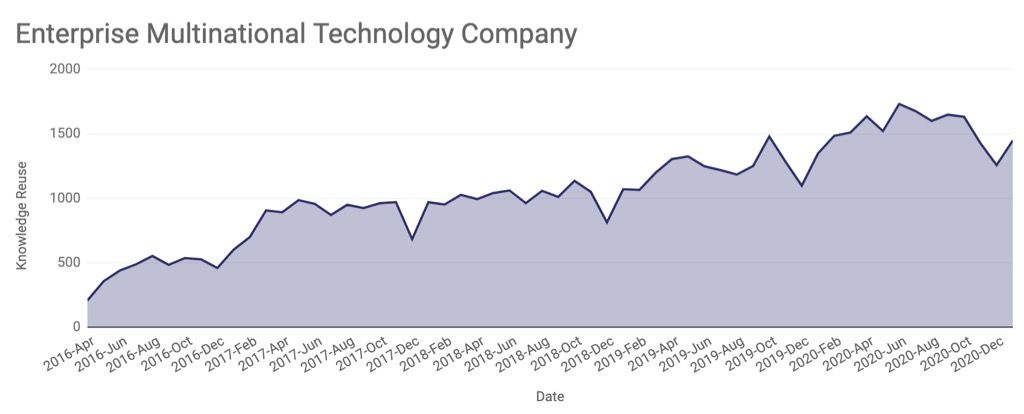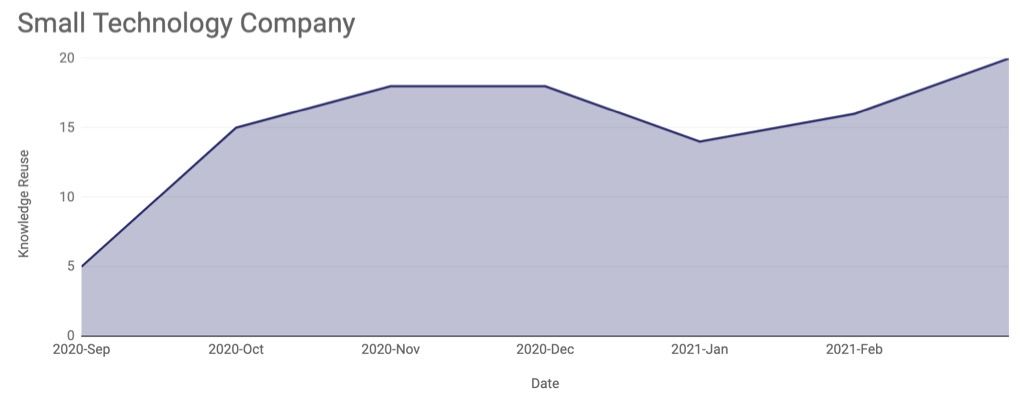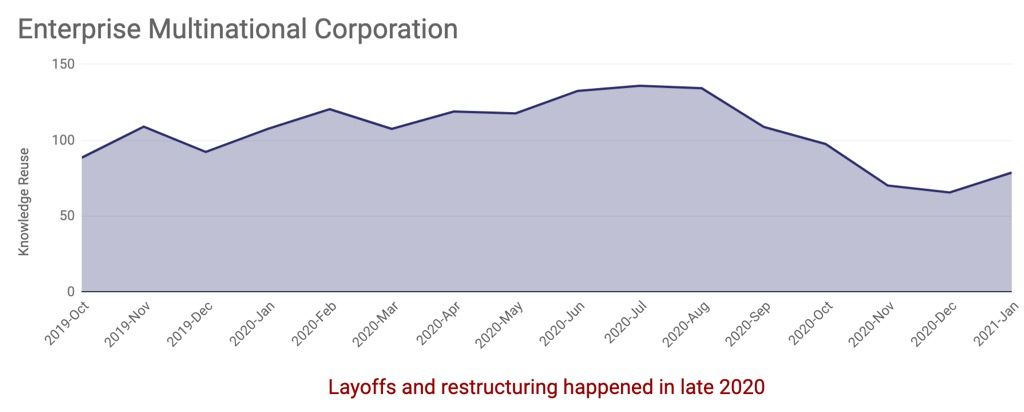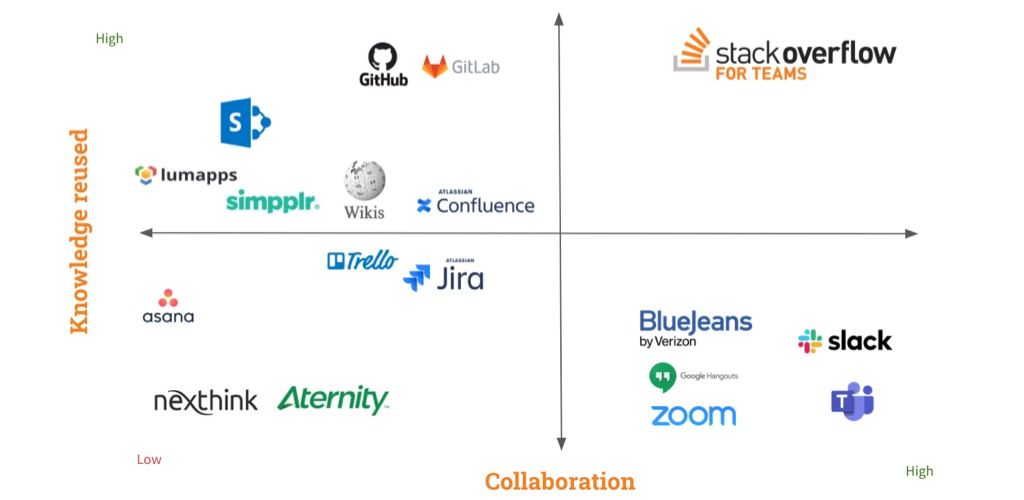How highly productive teams use knowledge reuse
What Innovative Organizations and Highly Productive Engineering Teams Have in Common: High Knowledge Reuse
Knowledge reuse is a natural outcome of knowledge sharing and collaboration. When someone is able to reuse knowledge that someone else has gained, it has a positive effect. It minimizes risk by making standardized information available to everyone and increases effectiveness by reducing repeat work and reducing interruptions.
This increases the flow, or focus, time of your employees.
- The more flow time, the more aha moments are possible.
- More aha moments relate to more problems or challenges being solved.
- More problems or challenges being solved increases innovation, productivity, revenue.
- And all that results in more knowledge that can be reused by others in the organization.
How is Knowledge Reuse measured?
Since the dawn of time, companies have struggled to show the ROI of knowledge sharing and collaboration platforms. For example, how a knowledge sharing platform may increase your team’s speed to market.
Rather than trying to measure the outputs, like increased productivity, we flipped it to look at the input. We measure if the platform is enabling knowledge reuse.
It’s a simple metric.
It measures the people who come to Stack Overflow for Teams, but don’t ask a question. They reused existing information from the knowledge base. We talk about the average Knowledge Reuse that happens on a daily basis.
Every time someone reuses knowledge they are saving their own time, they aren’t disturbing teammates, and they are learning new skills.
Clients see the value of the metric. They know that reusing knowledge is the only scalable way to improve technical skills, increase team problem-solving capabilities to drive innovation, and bridge communication gaps.
We’ll look at some real-life examples of Knowledge Reuse patterns from clients using Stack Overflow for Teams.
Knowledge Reuse Grows Over Time
In this example, you can see how knowledge reuse continues to grow over time.
This long time client has a healthy cycle of knowledge sharing, collaboration, and knowledge reuse happening in Stack Overflow for Teams. It’s expanded beyond just their technical teams and to the adjacent team members that are key partners to the technology organization. The platform allows cross functional teams to share and reuse knowledge and collaborate transparently, which feeds the amount of knowledge that can be reused by others in the company.
They are also able to see patterns of knowledge reuse that were invisible before. Look at the dips in knowledge reuse over time. Those correspond to winter holidays when many teammates start to wind down for the year. This is visible proof of how the platform organically measures productivity.

Knowledge Reuse Works for Small Teams Too
Knowledge reuse isn’t just a benefit for large companies or teams, small teams benefit from knowledge reuse too.
In this example of knowledge reuse, this technology company has almost their entire company of 100 people using the platform - with many of them in different countries. They started using it in September 2020 and within the first month saw the benefit of knowledge reuse, and it continues to grow over time.

Knowledge Reuse Prevents Knowledge Loss
In this example of knowledge reuse, we see how Stack Overflow for Teams prevented knowledge loss.
This client went through layoffs and restructuring in late 2020. You can see the monthly increase they were seeing in knowledge reusability before the action - hitting a peak of almost 150 times a day that people are taking existing knowledge and reusing it.
When the action happened in September 2020, their knowledge reuse decreased, as expected.
What didn’t decrease was the knowledge that was already shared and captured in Stack Overflow for Teams. All the knowledge from teammates that went into the platform, stayed in the platform. By bringing in Stack Overflow for Teams, this company was able to prevent institutional knowledge from leaving when the layoffs and restructuring happened.

Can Other Platforms Support Knowledge Reuse?
A lot of companies are using wikis or ChatOps to solve communication, growth, or knowledge sharing challenges. But those challenges aren’t being solved because those incomplete tools aren’t addressing knowledge reuse and collaboration.
With all the tools available to developers and technologists, why do we still have a problem with siloed knowledge and an overreliance on synchronous collaboration?
We think this is in part because the market has often identified tactical problems and offered tactical solutions, when really there are larger strategic questions about how to share knowledge and collaborate effectively and efficiently. Siloed knowledge doesn’t just need to be centralized, because more than that is needed to facilitate real sharing, at scale, and to facilitate collaboration across the organization.
We think of the market on an axis of Knowledge Reusability and Collaboration.
To clarify what we mean about collaboration. We’re not speaking about social networking or having employees be able to talk to one another. We’re talking about teammates working together to produce or create something.
In the lower left quadrant you have your low reusability and collaboration tools that are all about tactical employee experience or project management. In the upper left, you have your high reusability but low collaboration tools for code repositories and intranets or wikis. In the lower right, you have your low reusability and high collaboration tools from your meeting and ChatOps tools. In the upper right, you have the only tool that combines high reusability and high collaboration - Stack Overflow for Teams.

We know that some of these tools are very good at what they do - so we integrate with them rather than trying to replace them. We have integrations with Slack, Microsoft Teams, GitHub, and JIRA. This brings in the added benefit of reducing distractions and bringing the knowledge to the user, making for easier Knowledge Reuse, rather than making them search for it.
How does Knowledge Reuse Increase Productivity?
Knowledge reusability is a two-sided benefit. First, it unblocks the person who is looking for knowledge. They are able to get back to work faster and smarter than before. Second, it protects the time of the person who has the knowledge. They aren’t being interrupted, taken out of their flow, to answer questions from their teammates. They are helping and supporting their teammates on a bigger scale by adding their knowledge into the platform.